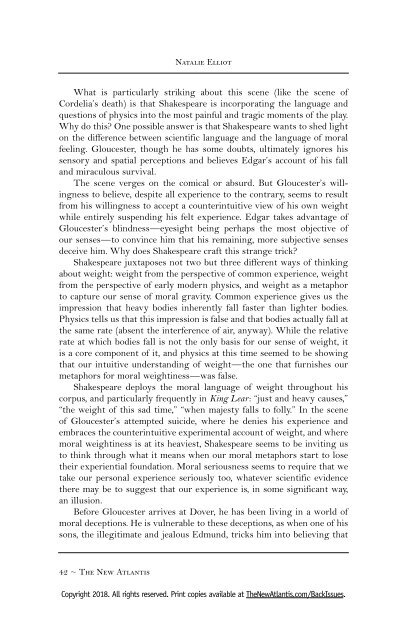The New Atlantis - Winter 2018 (Issue 54) uncompressed with cover
Create successful ePaper yourself
Turn your PDF publications into a flip-book with our unique Google optimized e-Paper software.
Natalie Elliot<br />
What is particularly striking about this scene (like the scene of<br />
Cordelia’s death) is that Shakespeare is incorporating the language and<br />
questions of physics into the most painful and tragic moments of the play.<br />
Why do this? One possible answer is that Shakespeare wants to shed light<br />
on the difference between scientific language and the language of moral<br />
feeling. Gloucester, though he has some doubts, ultimately ignores his<br />
sensory and spatial perceptions and believes Edgar’s account of his fall<br />
and miraculous survival.<br />
<strong>The</strong> scene verges on the comical or absurd. But Gloucester’s willingness<br />
to believe, despite all experience to the contrary, seems to result<br />
from his willingness to accept a counterintuitive view of his own weight<br />
while entirely suspending his felt experience. Edgar takes advantage of<br />
Gloucester’s blindness — eyesight being perhaps the most objective of<br />
our senses — to convince him that his remaining, more subjective senses<br />
deceive him. Why does Shakespeare craft this strange trick?<br />
Shakespeare juxtaposes not two but three different ways of thinking<br />
about weight: weight from the perspective of common experience, weight<br />
from the perspective of early modern physics, and weight as a metaphor<br />
to capture our sense of moral gravity. Common experience gives us the<br />
impression that heavy bodies inherently fall faster than lighter bodies.<br />
Physics tells us that this impression is false and that bodies actually fall at<br />
the same rate (absent the interference of air, anyway). While the relative<br />
rate at which bodies fall is not the only basis for our sense of weight, it<br />
is a core component of it, and physics at this time seemed to be showing<br />
that our intuitive understanding of weight — the one that furnishes our<br />
metaphors for moral weightiness — was false.<br />
Shakespeare deploys the moral language of weight throughout his<br />
corpus, and particularly frequently in King Lear: “just and heavy causes,”<br />
“the weight of this sad time,” “when majesty falls to folly.” In the scene<br />
of Gloucester’s attempted suicide, where he denies his experience and<br />
embraces the counterintuitive experimental account of weight, and where<br />
moral weightiness is at its heaviest, Shakespeare seems to be inviting us<br />
to think through what it means when our moral metaphors start to lose<br />
their experiential foundation. Moral seriousness seems to require that we<br />
take our personal experience seriously too, whatever scientific evidence<br />
there may be to suggest that our experience is, in some significant way,<br />
an illusion.<br />
Before Gloucester arrives at Dover, he has been living in a world of<br />
moral deceptions. He is vulnerable to these deceptions, as when one of his<br />
sons, the illegitimate and jealous Edmund, tricks him into believing that<br />
42 ~ <strong>The</strong> <strong>New</strong> <strong>Atlantis</strong><br />
Copyright <strong>2018</strong>. All rights reserved. Print copies available at <strong>The</strong><strong>New</strong><strong>Atlantis</strong>.com/Back<strong>Issue</strong>s.


